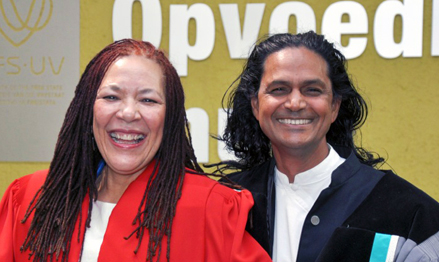Latest News Archive
Please select Category, Year, and then Month to display items
27 March 2023
|
Story Valentino Ndaba
![]()
This year, the University of the Free State will witness one of its biggest graduation seasons yet. A total of 19 ceremonies will take place this April. The Qwaqwa Campus will host four ceremonies from 14 to 15 April and the Bloemfontein Campus will host fifteen celebrations from 18 to 22 April 2023.
A grand total of 8 628 graduates will walk across the stage throughout the seven days. In addition, four honorary doctorates will also be conferred. Prof Stephen Brown will be awarded the Council Medal, Prof Mattheus Lötter is to receive the Chancellor's Medal.
Qwaqwa Campus Graduation Ceremonies

Bloemfontein and South Campus Graduation Ceremonies

For more information on guides and attires, click here.
Download the graduation schedule
here.
Rhodes professor calls for accountability in teacher education
2013-11-14
|
 |
Prof Jean Baxen of Rhodes University and Prof Dennis Francis, Dean of the Faculty of Education of the UFS.
Photo: Stephen Collett
15 November 2013 |
Lecture (pdf)
“Our education system needs quality teacher education.”
This was the message from Prof Jean Baxen, Deputy Dean of Research at Rhodes University in Grahamstown. She delivered the Education Public Lecture on ‘The lives of children, citizenship and teacher education: challenges and opportunities’ at the University of the Free State’s Bloemfontein Campus.
Growing up in White River, the rural areas of Eastern Transvaal (as it was previously known), Prof Baxen took the audience on a journey of the imagination. She shared stories of how she and fellow learners walked miles to get to school and how her son found himself in a situation of being unsure about his own racial identity, questioning what it meant to be ‘coloured’. She also related stories of how teachers are not sufficiently prepared to mediate information on HIV/Aids.
These stories revealed how little teachers cared, and also how difficult and challenging it is for learners to cope in such teaching and learning environments – thus calling for quality teacher education.
She stressed the fact that quality teacher education is needed in South Africa to assist in curbing the challenges children and fellow citizens come across in our broader society. “It is important that, as teacher educators, we should groom teachers to find and understand their identity, sexuality, and also the world they live in. There is an urgent need for us to hold ourselves and others accountable and to not distance ourselves and make it someone else’s responsibility – it is our joint responsibility as citizens,” she said.
We need a pedagogy that would navigate and start formulating a language that we could use to face these challenges, she proposed.